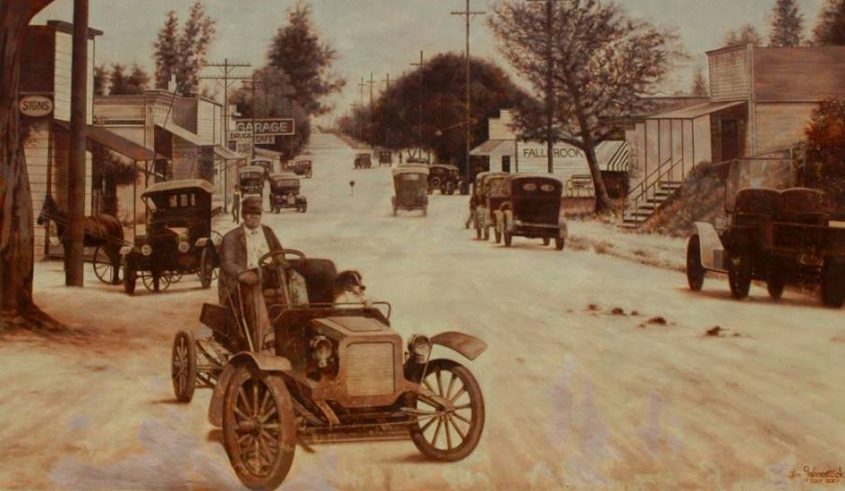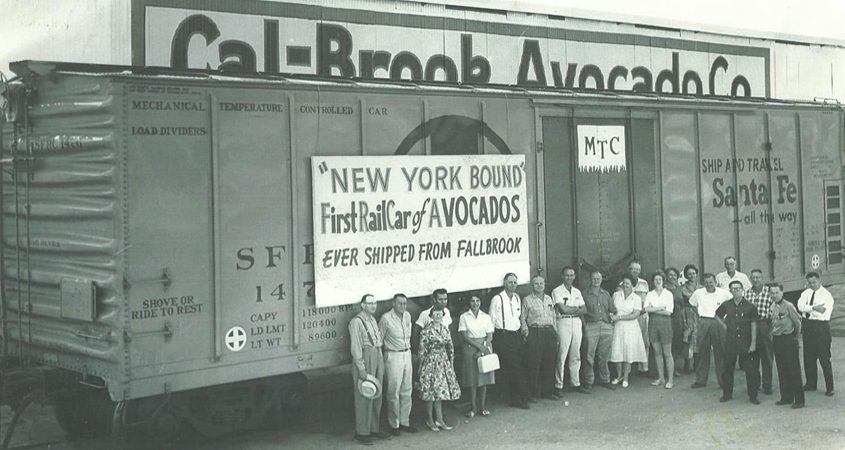San Diego County Water Authority
The Fallbrook Public Utility District on June 5, celebrated its 100th year of providing water and sewer service in Fallbrook. From its first years serving 800 customers, the utility district, or FPUD, now supplies water to more than 35,000 residents in North San Diego County.
The Fallbrook community celebrated FPUD’s centennial on June 4. Photo: Fallbrook Public Utility District
The public celebrated the centennial with an old west themed community celebration on Saturday, June 4, including water games and hands-on water/science labs for kids; antique tractors and vehicles; and activities led by North County Fire Department and the San Diego County Sheriff’s Department. A crowd of 1,200 residents took part in the celebration.
One hundred years of service
A mural depicting the Fallbrook community. Photo: Courtesy Fallbrook Historical Society
In 1922, the tiny Fallbrook Public Utility District consisted of 500 acres and was incorporated on June 5 to serve water from local area wells along the San Luis Rey River.
Fifteen years later, in 1937, the Fallbrook Irrigation District voted to dissolve, and a portion of the former Irrigation District became a part of FPUD, increasing FPUD’s footprint to 5,000 acres. Responding to the growth, FPUD developed additional groundwater supplies from the San Luis Rey and the Santa Margarita rivers.
As Colorado River water became available in 1948, water consumption gradually increased.
Customer service has always been a priority. This photo dates to the 1950s. Photo: Fallbrook Public Utility District
Customer service has always been a priority. This photo dates to the 1950s. Photo: Fallbrook Public Utility District
Significant expansions of the service area took place in 1950 when FPUD annexed the last remaining portion of the Fallbrook Irrigation District and in 1958 when the area to the north of town on both sides of the Santa Margarita River was annexed to the District. By 1959, FPUD was consuming 10,000 acre-feet per year. (An acre-foot is about 326,000 gallons, or enough to serve the annual needs of 2.5 typical four-person households for one year).
The use of Santa Margarita River water ended in 1969 when floods destroyed the district’s diversion works. One year before the floods, the U.S. federal government agreed to develop a dam and reservoir project on the river for FPUD and the U.S. Marine Corps Base Camp Pendleton. It was the culmination of 17 years of water rights litigation in the U.S. vs. Fallbrook case. The federally sponsored project was known as the Santa Margarita Project.
Imported water supports community development
When water became available in the 1920s, avocado trees were planted. By 1985, the region reached a peak of 88,000 acres of avocados. Photo: Fallbrook Historical Society
In 1978, FPUD began receiving water supplied by the California State Water Project, further supporting the area’s business, agricultural, and residential development.
FPUD’s footprint grew by 11,789 in 1990 when voters in the DeLuz Heights Municipal Water District to the northwest of FPUD decided to dissolve their 17-year-old district. Its entire service area was annexed to FPUD.
FPUD’s scope of operations grew once again in 1994 when the Fallbrook Sanitary District was dissolved, and FPUD assumed sewer service responsibilities within a 4,200-acre area of downtown Fallbrook.
Water supply from Santa Margarita River
In November 2021, FPUD celebrated the launch of the Santa Margarita River Conjunctive Use Project, some 70 years in the making. The district now receives approximately 50% of its water needs from the river. It was made possible by settling a lawsuit filed against FPUD in 1951 by the federal government over rights to the river.
Fallbrook is well-known for its high-quality agricultural crops, led by avocados and citrus. But according to the Fallbrook Historical Society, before the formation of FPUD, agriculture had to withstand drought conditions. Bee farming was widespread, followed by olives and cattle ranching.
When water became available in the 1920s, avocado trees were planted. By 1985, the region reached a peak of 88,000 acres of avocados. The Fallbrook area also supports commercial nurseries growing flowers, palms, cactus, and plants.
Planning for the next century
Imported water permitted Fallbrook to thrive. This view of Main Street is from 1984. Photo: Fallbrook Historical Society
Today after 100 years, the District provides imported and local water and sewer service to 28,000 acres. About 30% of the water is used by agriculture. FPUD also produces about one and one-half million gallons of recycled water daily to irrigate nurseries, playing fields, landscaped freeway medians, homeowners associations, and common areas.
(Editor’s note: The Fallbrook Public Utility District is one of the San Diego County Water Authority’s 24 member agencies that deliver water across the metropolitan San Diego region.)







